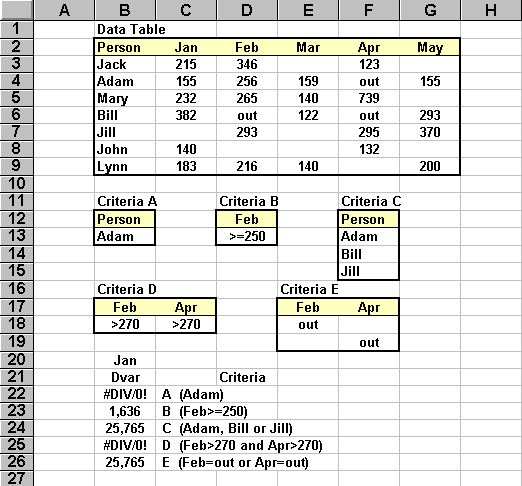 Use:
Use:- Computes the conditional sample variance of the values in a specified column of a
database table
 Syntax:
Syntax:- DVAR( table , column , criteria )
 Examples:
Examples:- Cell B22 formula: DVAR( B2:G9 , "Jan" , B12:B13 )
Cell B23 formula: DVAR( B2:G9 , "Jan" , D12:D13 )
Cell B24 formula: DVAR( B2:G9 , "Jan" , F12:F15 )
Cell B25 formula: DVAR( B2:G9 , "Jan" , B17:C18 )
Cell B26 formula: DVAR( B2:G9 , "Jan" , E17:F19 ) 
 Notes:
Notes:- Only one row (Adam) satisfies criteria A. Since DVAR divides by N-1, it is impossible to
compute the variance. This is indicated by the #DIV/0! message.
Only one row (Jill) satisfies criteria D. Since there is no data in the Jill-Jan cell,
it is impossible to compute the variance. This is indicated by the #DIV/0! message.
Column can be (1) an integer between one and the number of columns in the table, (2)
the unique name of the desired column, or (3) a cell address containing the desired column
number or name. For example, the following are equivalent ways to process the Jan column:
 DVAR( B2:G9 , 2 , B12:B13 )
DVAR( B2:G9 , 2 , B12:B13 )
 DVAR( B2:G9 , "Jan" , B12:B13 )
DVAR( B2:G9 , "Jan" , B12:B13 )
 DVAR( B2:G9 , D20 , B12:B13 )
DVAR( B2:G9 , D20 , B12:B13 )
 Dfunction Overview
Dfunction Overview Related Functions:
Related Functions:- DVARP, DSTDEV, DSTDEVP,
DAVERAGE, DSUM, DCOUNT,
DCOUNTA, DMIN, DMAX,
DGET
![]()

![]() DVAR( B2:G9 , 2 , B12:B13 )
DVAR( B2:G9 , 2 , B12:B13 ) ![]() DVAR( B2:G9 , "Jan" , B12:B13 )
DVAR( B2:G9 , "Jan" , B12:B13 ) ![]() DVAR( B2:G9 , D20 , B12:B13 )
DVAR( B2:G9 , D20 , B12:B13 )